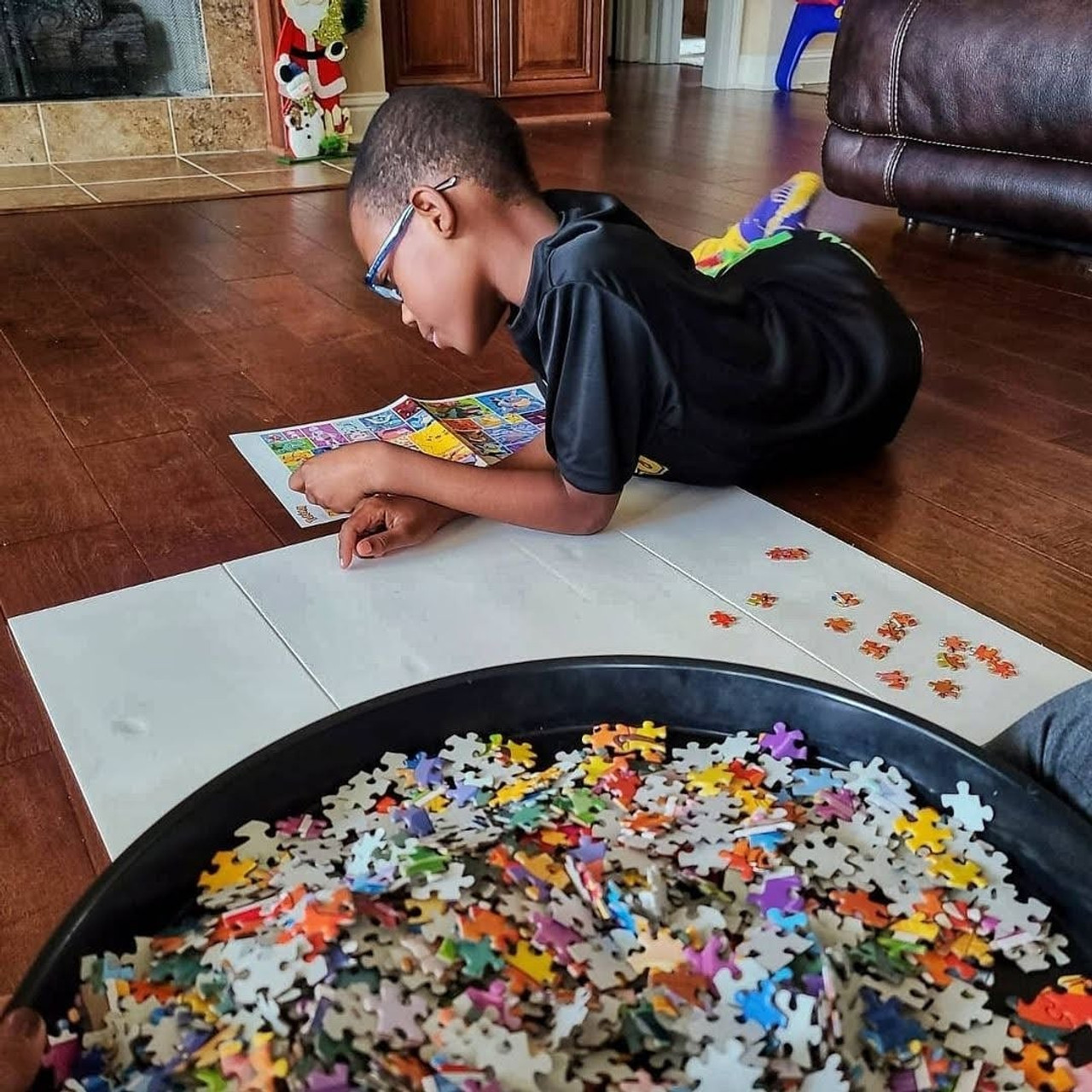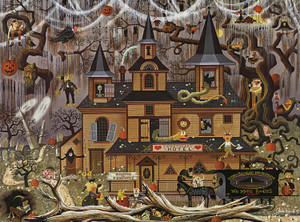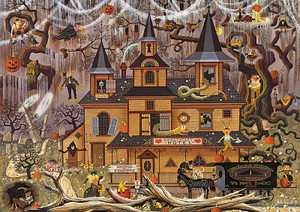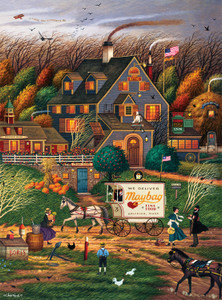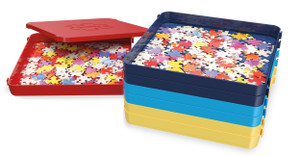Posted by Buffalo Games on Jun 28th 2022
Why Are Puzzles So Relaxing?
Ah, the charmed life. Is there anything better?
You may have heard about that exercise in which you take a page or two to write out your perfect day from start to finish. You jot down all of the details, such as the people you love, the stuff you would do together, and the things you would see.
When we did this, our day featured a 2000-piece jigsaw puzzle, a rainy day, lots of coffee, and perhaps an audiobook. You don’t seem surprised.
Well, it’s not like there’s a rule for how to relax with jigsaw puzzles, is there? You can puzzle in the park on a sunny day. You can do it on a plane, in a train, in Spain while it rains — wait. This is getting out of hand. Before cats begin showing up in hats, let’s get on with it.
Simplification
The main reason jigsaw puzzles are so relaxing is because they simplify your world — even for just a short time.
After a few minutes spent diligently trying to fit together a classic Charles Wysocki horse and buggy or a thematically bright-hued Aimee Stewart collage, your thoughts will become remarkably less jumbled. Your breathing will become more relaxed, and your muscles will probably unclench.
There’s just something undeniably satisfying in the soft snap of the pieces as they lock together. This simple, repetitive action tends to push chaos and jumbled thoughts far from the puzzler.
The world becomes one problem — easily managed — instead of 20, which threaten to overwhelm you. With a puzzle, it’s rather like giving your brain a time-out. Your thoughts calm down and organize themselves as you get a peaceful little break from all of your anxiety.
Redirection
Although we’re not psychologists around here, we do know how to use Google, and we did a little poking around to discover that there really are psychological benefits to puzzling.
It’s called “redirecting,” and it works like this: Let’s say your problems are a big bully and your normal life is a rock concert.
Work with us here.
Let’s say that normally, your rock concert is great; it goes off without a hitch. The lights are bright and well-timed. The haze machines and lasers and pyrotechnics all sync up wonderfully, and the band is jammin’.
But sometimes, when the pressures of life are high, the bully shows up backstage and starts throwing switches, turning off mission-critical components. That is really uncool.
What can you do?
Confrontation is not the solution to this problem. In fact, that will make it much worse. If you step up to your stress and take it head-on, it’s going to punch you in the face. But if you redirect it, you may be surprised what happens.
Imagine walking up to your rock concert bully, stepping between him and his next victim, and saying cheerfully, “Hey, buddy! Did you know that they’re giving away free Chick-fil-A sandwiches at the food concourse?” Watch the bully run. And watch your own stress levels instantly decrease.
This is redirection. And you can even accomplish it with jigsaw puzzles. That’s why sitting down with a 1000-piece puzzle is so calming. It’s because, while you’re distracted, the bully within has no havoc to wreak. He’s busy stuffing his gullet with Chick-fil-A sandwich — if that makes any sense at all.
Meditation
Worry produces stress. That’s a fact.
It’s also a fact that the process of solving a jigsaw puzzle is meditative and that meditative exercises are good for you. We’re not scientists; we’re puzzle experts, so we’ll just break this down “potato head style,” as our favorite teacher used to say.
It’s incredibly calming to solve jigsaw puzzles, in part because you’re looking at the same image for long stretches of time.
Imagine the contrast between one of these calming 1000-piece jigsaw puzzles and watching a TV show, for instance — especially nowadays, with all those dadgum special effects and explosions and whatnot. Calming is not a word we would choose to describe it.
But calm is what happens when you ponder your next move with a 1000-piece puzzle because you’re not being bombarded by photons and flashes and unrealistic interpersonal drama every two seconds.
No wonder modern life is crazier than a bag of cats. People need to sit down and solve more jigsaw puzzles — period.
Quality of Community
There’s a great deal of talk in certain circles about how we’re now more connected than ever. But if you define connectedness based on how many apps you’re signed into on your smartphone or how many devices you can use to experience the metaverse, your definition just might ring hollow. There’s another word for virtual, and that’s counterfeit.
Could it be that, no matter how many changes have made society “better” over the years, the real definition of community hasn’t changed at all? Humans still need to look each other in the eye, sit at a table together, and have meaningful conversations that provoke deep thought and reflection.
Even if your conversations are based around the 2000-piece puzzle you’re working on and just include you asking your friend whether he has an edge piece with a little bit of pink in it — you’re light years ahead of most people these days. As a side benefit, you’re probably a whole lot healthier, too.
Jigsaw puzzles are really kind of amazing because they’re just as soothing for the individual who needs a little alone time as they are stimulating for a lonely person who needs someone to sit down with them and accomplish something together in order to feel a little more human — or a little more seen and heard.
Jigsaw puzzles make all this possible. Who would have thought that the answer to a better quality of life would come in a cardboard box and be about a hundred times cheaper than all those devices our modern life attempts to throw at us, insisting they are essentials?
Maybe what’s essential has more to do with people, not things, and quality over quantity. Jigsaw puzzles just may be the answer to all of the world’s problems.
